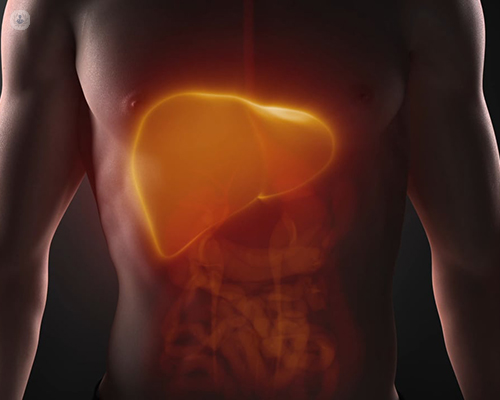Why see a hepatologist (liver specialist)?
Written by:The liver has an important role in our bodies – it is a vital organ which supports nearly every other organ in the body in some way. Liver function is essential for a healthy body, as it helps to regulate toxins and chemical levels in the blood, digest food, and process nutrients. The liver is estimated to perform over 500 vital functions in the body. If your doctor suspects you may be having a problem with your liver, or it is not functioning as it should be, they may refer you on to a specialist called a hepatologist. Here, Professor Kevin Moore explains what a liver specialist does, and the kinds of patient he is able to see.

What is hepatology and what does a hepatologist do?
The word ‘hepatology’ comes from the Ancient Greek ‘hepar’ or ‘hepato’, meaning ‘liver’, and ‘ology’, referring to the study of a particular field or topic. Hepatology concerns the study of the liver, gallbladder, pancreas, and biliary ducts, and the management of related disorders.
Hepatology was traditionally considered to be a subspecialty of gastroenterology, which focuses on the entire digestive system and related disorders, including study of the colon, anus, intestine, stomach, and liver, among other organs and functions. However, hepatology is a rapidly expanding field, and is now becoming recognised as a specialty in its own right, thanks to further understanding of the field and medical advances in the treatment and study of the liver.
Is a gastroenterologist the same as a hepatologist?
Both hepatologists and gastroenterologists can diagnose and treat problems with the liver and biliary system, as they usually start from the same path. After obtaining a degree, trainees study for five years, often studying general internal medicine alongside their gastroenterology specialisation. However, in order to receive adequate certification in hepatology, a trainee in the UK must spend at least two years training in liver disease after enrolling in a gastroenterology programme.
Hepatologists gain specialist experience in management of the liver and the biliary systems in these two years, focusing and devoting their time to this rather than an umbrella study of different organs. All gastroenterologists have the basic level of understanding, but a hepatologist has a higher, more detailed understanding of the liver and its functions. Even after choosing to specialise, they will spend many years researching and investigating further in their field. This means they are the ideal specialist to be referred to when dealing with liver problems.
What do hepatologists treat?
Hepatologists diagnose and treat all manner of liver problems, including:
- Cirrhosis caused by significant scarring on the liver
- Alcohol damage to the liver and alcohol related cirrhosis
- Hepatitis (acute or chronic)
- Fatty liver disease
- Drug problems affecting the liver
- Liver cancer
- Any cause of liver disease such as autoimmune liver disease, PBC, PSC etc
They also can treat other problems relating to the biliary system, including gallstones, and inflammation of the pancreas (pancreatitis).
A hepatologist will also monitor patients who undergo liver surgery, such as a liver transplant, giving them the adequate pre and post-op care. Hepatologists are not surgeons, so they do not perform transplants, but they can diagnose patients and help decide if surgery is necessary.
How can I see a hepatologist if I have a liver problem?
Most patients are referred to hepatologists from their GP, who can refer them for many reasons, such as abnormal liver function tests, jaundice, alcohol misuse or suspected hepatitis. If you are not sure whether your problem is related to the liver, visiting your healthcare provider for referral is best advised, making the best use of both your time and the doctor’s.
Some people also have ongoing liver problems, or seek pre/post-operative care for liver surgery. Other patients may have been referred to a specialist but would like to have a second opinion. If you want to find out if your hepatologist is certified and accredited, you can check medical resources, search reputable doctor databases, ask your insurance provider, or consult a GP.
What is a fibroscan and can I have one?
A fibroscan is a simple test carried out in the clinic where the doctors assess the stiffness of your liver. Anyone who has chronic inflammation of the liver, be it secondary to alcohol, chronic viral hepatitis, fatty liver disease or other liver diseases may develop scarring of the liver. In the past we could only diagnose this by carrying out a liver biopsy. This simple test involves applying a probe against the liver in between the ribs, and the probe literally flicks the skin overlying the liver and assesses how “wobbly” the liver is, just as if you flick a piece of jelly. A healthy liver is a wobbly liver and a normal liver stiffness is less than 6.5 kPa (kPa, or kilopascal, is used to measure pressure). The newer fibroscan machines also assess the fat content by measurement of the CAP score (normal <220 dbm).


